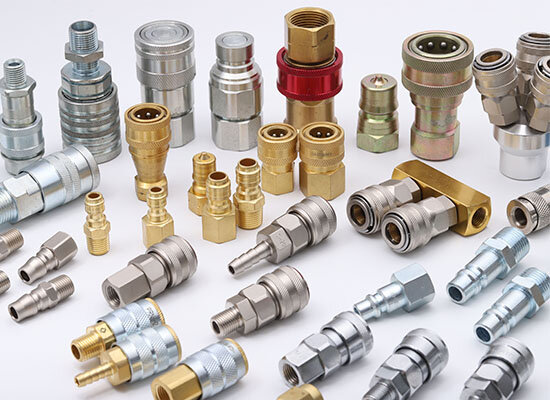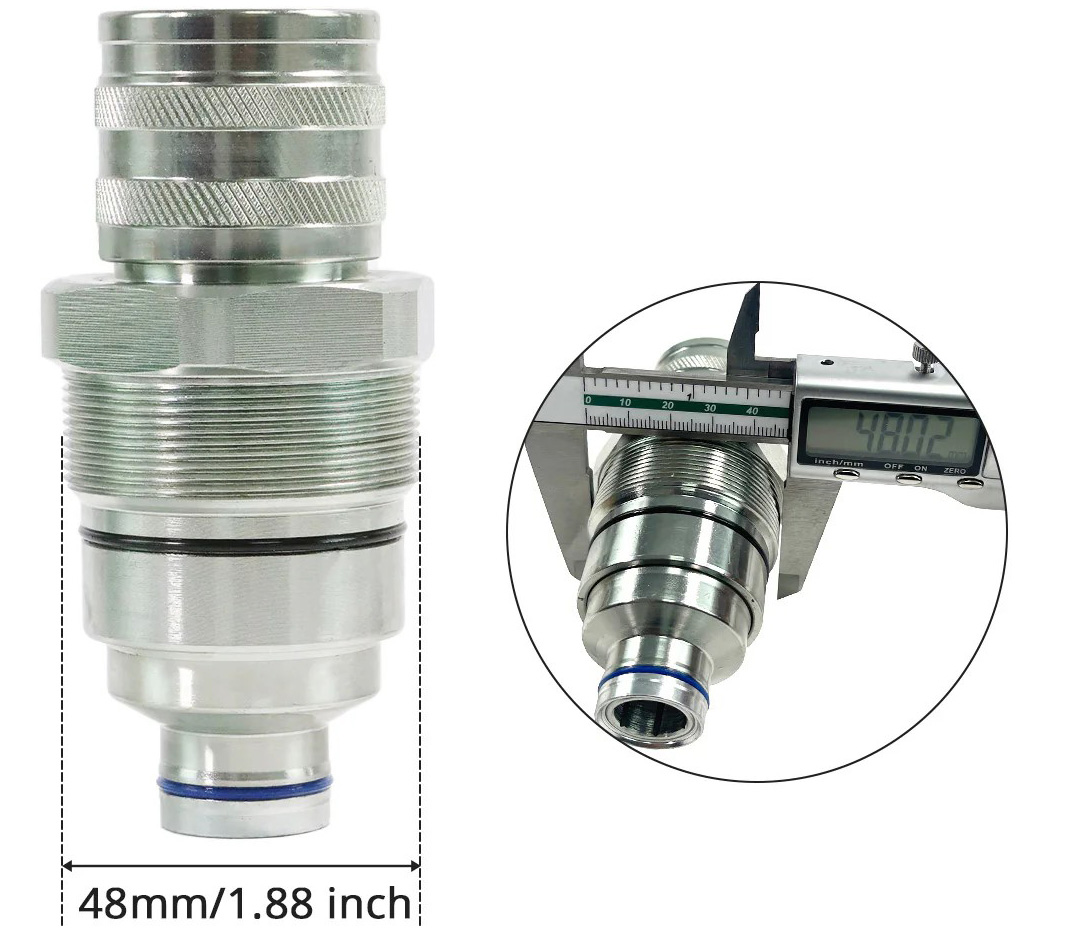
Hydraulic quick couplers are essential components in hydraulic systems, enabling quick and efficient connection and disconnection of hydraulic hoses or lines. These couplers help ensure smooth operation and minimize downtime in various industrial applications.
Hydraulic couplers are essential transmission components used in hydraulic systems to connect pipelines and various system elements. Their primary function is to ensure the safe, reliable transfer of high-pressure fluid between different hydraulic components.
Depending on application requirements, hydraulic couplers are available in several forms, including threaded couplings, flange couplings, and quick couplings.
High-quality hydraulic couplings must not only provide excellent sealing performance but also withstand high pressure, resist corrosion, and endure vibrations to operate reliably under demanding conditions. They are widely used in construction machinery, agricultural equipment, industrial manufacturing, marine applications, and mining operations, serving as critical components to ensure the efficient and stable operation of hydraulic systems.
Hydraulic quick coupler is not only a kind of hydraulic coupler,but also a essential hydraulic component in hydraulic systems, The biggest difference between it and threaded or flange couplings is that quick couplers enable quick and efficient connection and disconnection of hydraulic hoses or lines. They allow operators to quickly switch hydraulic attachments without the need for tools, significantly improving work efficiency and safety.Hydraulic quick coupler helps ensure smooth operation and minimize downtime in various industrial applications.Commonly,hydraulic quick fittings usually consist of a male end and a female end, which are sealed and matched by pushing, twisting and thread.Proper connection can effectively maintain sealing.
Different hydraulic quick coupler types vary significantly in their:Performance,Sealing capability,Pressure rating,Contamination resistance,Compatibility with equipment and Operational safety.
Choosing the correct coupler directly affects equipment efficiency, long-term reliability, and the safety of the entire hydraulic system.

Different types of Hydraulic Quick Coupler are mainly distinguished by the different connection methods,material,structure.
l Japanese Type Open Hydraulic Quick Coupler
l American Type Open Hydraulic Quick Coupler
l Thread Locking Hydraulic Quick Coupler
l Flat Face Hydraulic Quick Coupling
l Push and Pull Type Hydraulic Quick Coupling
l Stainless Steel Hydraulic Quick Coupling
l Medium-Pressure Hydraulic Quick Coupling
l Ball Valves Type Hydraulic Quick Coupling
Flat Face Coulper is a typical type of quick hydraulic coupler, and the specific data comparison with traditional Thread Locking Coupler are as follows:
| Parameter | Flat Face Coupler | Thread Locking Coupler |
| Pressure Rating | Medium to high pressure | high pressure |
| Connection Method | Push-to-connect or sleeve-type locking | Manual screw-on threaded locking |
| Sealing Performance | Excellent | Very high |
| Contamination Resistance | Excellent | Good |
| Connection Speed | Fast | Slow |
| Vibration Resistance | Moderate | Very high |
| Maintenance Frequency | Low | Low |
From the above table, it can be seen that the Flat Face Coupler has significant advantages in terms of sealing performance compared to traditional threaded hydraulic coupler, as well as in terms of connection convenience and speed.
Hydraulic quick coupler plays a crucial role across various industries, adapting to the specific demands of each sector to ensure efficient and reliable hydraulic connections.
Agriculture: Flat face coupler helps prevent contamination of hydraulic systems in tractors, harvesters, and sprayers by minimizing dirt ingress and oil leakage during frequent tool changes.
Construction and Engineering Machinery Industry:Threaded locking hydraulic quick coupler, on the basis of fast insertion and extraction, adds a threaded locking mechanism to achieve a firm combination of male and female joints. It adopts a dual sealing or metal rubber composite sealing structure to withstand stronger pressure. There are also dust caps or automatic sealing ports that can effectively prevent impurities such as dust, sediment, and water from entering. Very suitable for applications such as excavators, bulldozers, hydraulic hammers, concrete pump trucks, etc.
When selecting hydraulic quick coupler, understanding their compatibility and compliance with industry standards is crucial to ensure seamless integration and reliable operation across different equipment and manufacturers.
ISO 7241 A Quick Coupler is an internationally recognized standard that defines the dimensions, pressure ratings, and interchangeability requirements for hydraulic quick couplers. Couplers conforming to this standard ensure cross-brand compatibility, allowing users to mix and match components from different manufacturers without compromising performance or safety.
Japanese type quick coupler is mainly used in the Asian market and follow regional standards that emphasize compact design and efficient sealing. The size and connection mechanism of this kind coupler may vary slightly, but many manufacturers provide adapters to ensure interoperability with ISO or American types.
American style coupler is common in some regions of North America and Latin America, adhering to standards that emphasize sturdy structures and high flow rates. It is designed specifically for heavy-duty applications and may have proprietary designs, so careful specification matching is required when replacing or upgrading components.
Flat Face Quick Coupler has flat sealing surfaces that reduce fluid loss and contamination during disconnection, making them ideal for clean and frequent connections.
Poppet Quick Coupler uses internal valves that open to allow flow and close to prevent leaks but may have slight fluid loss when disconnected.
Comparison of Flat Face and Push and Pull in Some Specific Parameters:
| Feature | Flat Face | Push and Pull |
| Leakage on Disconnect | Minimal to none | Moderate |
| Contamination Resistance | High | Moderate |
| Connection Speed | Fast | Vary Fast |
| Pressure Handling | Medium to high | Medium to high |
| Durability | Good | Good |
| Maintenance | Low | Moderate |
You can follow the steps below to identify hydraulic connectors or other connectors:
Each quick coupling series has a unique mating profile.This is often the quickest way to tell them apart.
Most quality quick couplers have part numbers, manufacturer names, pressure ratings, or ISO standard marked on the body. These can help you look up specifications or identify the standard type.
Use a caliper to measure such as body size,thread type,length and diameter.
Thread type BSP, NPT, Metric, etc.
Overall length and diameter.
For each type of hydraulic quick coupler is suitable for specific equipment or industry usage scenarios, the following introduction is made:
Stainless Steel Hydraulic Quick Coupling
Marine equipment
Chemical processing machines
Food-grade and pharmaceutical machinery
Corrosive environments
Medium-Pressure Hydraulic Quick Coupling
Agricultural machinery
Skid steers and loaders
Hydraulic cylinders and hand tools
Ball Valves Type Hydraulic Quick Coupling
Construction and mining equipment
Hydraulic breaker attachments
Oil & gas field machinery
Hydraulic quick couplers find use in a wide range of industries due to their versatility, including:
◆ Construction
In construction machinery, such as excavators and loaders, hydraulic quick couplers are essential for quickly swapping out tools and attachments. They help streamline operations and minimize downtime.
◆ Agriculture
Hydraulic couplers are used in agricultural equipment like tractors and harvesters to ensure efficient fluid transfer and quick attachment changes between various implements.
◆ Manufacturing
In factories and workshops, hydraulic quick couplers allow rapid connection and disconnection of machinery, facilitating maintenance and minimizing interruptions to production lines.
◆ Medical Equipment
Some specialized medical devices require precise hydraulic connections. Quick couplings in this sector ensure safe, efficient, and reliable performance in applications such as patient handling and medical robotic systems.
◆ Oil & Gas
In the oil and gas industry, hydraulic quick couplers are used for fast and secure connections in drilling equipment, subsea operations, and pipeline systems, ensuring both efficiency and safety.
Fokca provides customizable hydraulic quick coupler types and solutions tailored to your unique requirements, ensuring optimal compatibility and performance in your system.
For more details about our Hydraulic Quick Couplers , please visit our dedicated product information or contact us!
Q1.What's the most leak-proof hydraulic quick coupler?
Flat Face Hydraulic Quick Coupler is generally the most leak-proof. It features a flush, flat sealing surface that minimizes fluid loss and air inclusion during disconnection — ideal for clean, high-pressure systems.
Q2.How do I change quick coupler types?
Depressurize the system fully.
Disconnect the existing couplers.
Match thread size and type on the new coupler.
Install and test for leaks and fitment.
Q3.Can I mix hydraulic quick coupler types?
Most coupler types are not cross-compatible.Flat face, poppet, and ball valve types often have different sealing and locking mechanisms,do not mix them.
Links: www.fescolo.com(Pneumatic)
FOKCA ©1998-2025 All Rights Reserved Sitemap